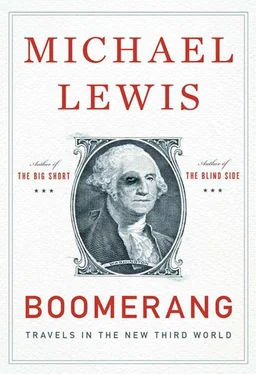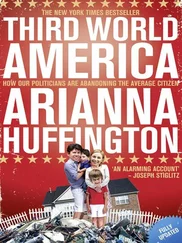Across the financial markets this episode repeated itself. People who had made a private bet that had gone wrong and didn’t expect to be repaid in full were handed their money back—from the Irish taxpayer.
In retrospect, now that the Irish bank losses are known to be world historically huge, the decision to cover them appears not merely odd but suicidal. A handful of Irish bankers incurred debts they could never repay, of something like 100 billion euros. They may have had no idea what they were doing, but they did it all the same. Their debts were private—owed by them to investors around the world—and still the Irish people have undertaken to repay them as if they were obligations of the state. For two years they have labored under this impossible burden with scarcely a peep of protest. What’s more, all of the policy decisions since September 29, 2008, have set the hook more firmly inside the mouths of the Irish public. In January 2009 the Irish government nationalized Anglo Irish and its losses of 34 billion euros (and mounting). In late 2009 they created the National Asset Management Agency, the Irish version of the Troubled Asset Relief Program (TARP), but, unlike the U.S. government, actually followed through, and bought 80 billion euros’ worth of crappy assets from the Irish banks.
A SINGLE DECISION sank Ireland, but when I ask Lenihan about it he becomes impatient, as if it isn’t a fit topic for conversation. It wasn’t much of a decision, he says, as he had no choice. Irish financial market rules are patterned on English law, and under English law the bondholders enjoy the same status as the ordinary depositors. That is, it was against the law to protect the little people with deposits in the bank without also saving the big investors who owned Irish bank bonds.
This rings a bell. When U.S. Treasury Secretary Hank Paulson realized that allowing Lehman Brothers to fail was viewed not as brave and principled but catastrophic, he, too, claimed he’d done what he’d done because the law gave him no other option. In the heat of the crisis, Paulson neglected to mention the law, just as Lenihan didn’t bring up the law requiring him to pay off the banks’ private lenders until long after he’d done it. In both cases the explanation was legalistic: narrowly true, but generally false. The Irish government always had the power to impose losses on even the senior bondholders, if it wanted to. “Senior people have forgotten that the government has certain powers,” as Morgan Kelly puts it. “You can conscript people. You can send them off to certain death. You can change the law .”
On September 30, 2008, in the heat of the moment, Lenihan gave the same argument for guaranteeing the bank’s debts as Merrill Lynch: to prevent “contagion.” Tell financial markets that a loan to an Irish bank was a loan to the Irish government and investors would calm down. For who would doubt the credit of the Irish government? A few months later, when suspicions arose that the bank losses were so vast that they might bankrupt the Irish government, Lenihan offered a new reason for the government’s gift to private investors: the bonds were owned by Irish savings banks. Up until then the government’s line had been that they did not have any idea who owned the bank’s bonds. Now they said that if the Irish government didn’t eat the losses, Irish savers would pay the price. The Irish, in other words, were simply saving the Irish. This wasn’t true: it provoked a cry of outrage from the Irish savings banks, who said they didn’t own the bonds, and that they disapproved of the government’s bestowing a huge gift on those who did. A political investigative blog called Guido Fawkes somehow obtained a list of the foreign bondholders: German banks, French banks, German investment funds, Goldman Sachs. (Yes: even the Irish did their bit for Goldman.)
ACROSS EUROPE JUST now men who thought their title was “minister of finance” have woken up to the idea that their job is actually government bond salesman. The Irish bank losses have obviously bankrupted Ireland, but the Irish finance minister does not want to talk about that. Instead he mentions to me, several times, that Ireland is “fully funded” until next summer. That is, the Irish government has enough cash in the bank to pay its bills until next July.
It isn’t until I’m on my way out the door that I realize how trivial this point is. The blunt truth is that since September 2008 Ireland has been every day more at the mercy of her creditors. To remain afloat, Ireland’s banks, which are now owned by the Irish government, have taken short-term loans from the European Central Bank of 85 billion euros. Inside of a week Lenihan will be compelled by the European Union to invite the IMF into Ireland, relinquish control of Irish finances, and accept a bailout package. The Irish public doesn’t yet know it, but, even as the minister of finance and I sit together at his conference table, the European Central Bank has lost interest in lending to Irish banks. And soon Brian Lenihan will stand up in the Irish parliament and offer a fourth explanation for why private investors in Ireland’s banks cannot be allowed to take losses. “There is simply no way that this country, whose banks are so dependent on international investors, can unilaterally renege on senior bondholders against the wishes of the ECB,” he will say.
But there was once a time when the wishes of the ECB didn’t matter so much to Ireland. That time was before the Irish government used ECB money to pay off the foreign bondholders in Irish banks.
ONCE A DECADE I experiment with driving on the wrong side of the road, and wind up destroying dozens of side-view mirrors on cars parked on the left. When I went looking for some Irish person to drive me around, the result was a fellow I will call Ian McRory, who is Irish, and a driver, but pretty clearly a lot of other things, too. He has what appears to be a military-grade navigational system, for instance, and surprising knowledge about abstruse and secretive matters. “I do some personal security, and things of that nature,” he says, when I ask him what else he does other than drive financial-disaster tourists back and forth across Ireland, and leaves it at that. Later, when I mention the name of a formerly rich Irish property developer, he says, casually, as if it were all in a day’s work, that he had “let himself into” the fellow’s vacation house and snapped photographs of the interior “for a man I know who is thinking of buying it.”
Ian turns out to have a good feel for what little I, or anyone else, might find interesting in rural Ireland. He will say, for example, “Over there, that’s a pretty typical fairy ring,” and then explain, interestingly, that these circles of stones or mushrooms that occur seemingly naturally in Irish fields are believed by local farmers to house mythical creatures. “Irish people actually believe in fairies?” I will ask, straining but failing to catch a glimpse of the typical fairy ring to which Ian has just pointed. “I mean if you walked right up and asked him to his face, ‘Do you believe in fairies?’ most guys will deny it,” he will reply. “But if you ask him to dig out the fairy ring on his property, he won’t do it. To my way of thinking that’s believing.” And it is. It’s a tactical belief, a belief that exists because the upside to disbelief is too small, like the former Irish belief that Irish land prices could rise forever.
The highway out of Dublin runs past abandoned building sites and neighborhoods without people in them. “We can stop at ghost estates on the way,” says Ian, as we clear the suburbs of Dublin. “But if we stop at every one of them, we’ll never get out of here.” We pass wet green fields carved by potato farmers into small plots and, every now and then, a small village, but even the inhabited places feel desolate. The Irish countryside remains a place people flee. Among its drawbacks, from the outsider’s point of view, is the weather. “It’s always either raining or about to rain,” says Ian. “I drove a black guy from Africa around the country once. It’s raining the whole time. He says to me, ‘I don’t know why people live here. It’s like living under an elephant.’”
Читать дальше












